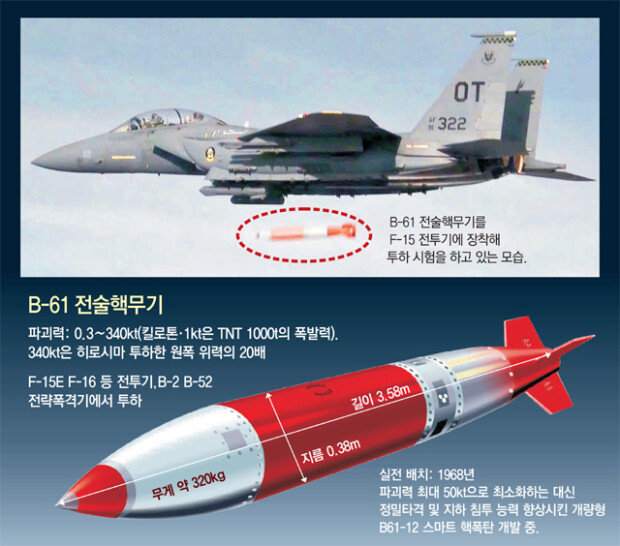U.S. report proposes ‘sharing of nuclear capabilities with S. Korea, Japan
U.S. report proposes ‘sharing of nuclear capabilities with S. Korea, Japan
Posted July. 31, 2019 07:37,
Updated July. 31, 2019 07:37

A proposal made by the National Defense University (NDU) under the U.S. Department of Defense in its recent report for the U.S. to share its nonstrategic nuclear capabilities with South Korea and Japan is causing a stir in conjunction with North Korea’s resumption of provocations.
An agreement similar to the “nuclear sharing arrangement” with South Korea and Japan suggested by the NDU is already in place among NATO countries. About 150 to 200 B61 nuclear bombs are deployed to U.S. bases located in five allies – Germany, Belgium, Turkey, the Netherlands, and Italy – and will be airdropped using battleplanes of the countries in case of emergency.
As the U.S. has the ownership of the nuclear bombs, the five allies are not considered to be in violation of the Treaty on the Non-Proliferation of Nuclear Weapons. The “final approval code” for nuclear bombs to be operable is controlled by the U.S. and the five countries practically execute 50% of the right to use nuclear bombs as they offer battleplanes that the bombs are loaded onto and dropped from. Joint approval by the presidents of the U.S. and the country concerned is required for nuclear weapons to be used.
The report said the U.S.’ nuclear sharing arrangement with South Korea and Japan will deter the nuclear and missile threats by North Korea and add pressure on China to prevent North Korea’s provocations. However, the report added a condition that NATO’s current nuclear sharing model should not be mirrored as it is, which is interpreted as the U.S. will be in charge of airdropping nuclear bombs while South Korea and Japan will be given the right for joint use.
“It means the actual use of nuclear bombs must be strictly controlled in consideration of the huge amount of conventional weapons deployed along the Military Demarcation Line between the two Koreas and the potential use of nuclear weapons by North Korea,” said a military source.
Strong opposition from the neighboring countries, such as China and Russia, is also expected. “If the U.S.’ nuclear capabilities are deployed to South Korea, China will put all-around pressure on Seoul to a level incomparable to the THAAD case and Russia may join in such movement as well,” said a South Korean government official.
Hyo-Ju Son hjson@donga.com




![[천광암 칼럼]장동혁은 대체 왜 이럴까](https://dimg.donga.com/c/138/175/90/1/wps/NEWS/IMAGE/2026/02/22/133399127.1.jpg)


